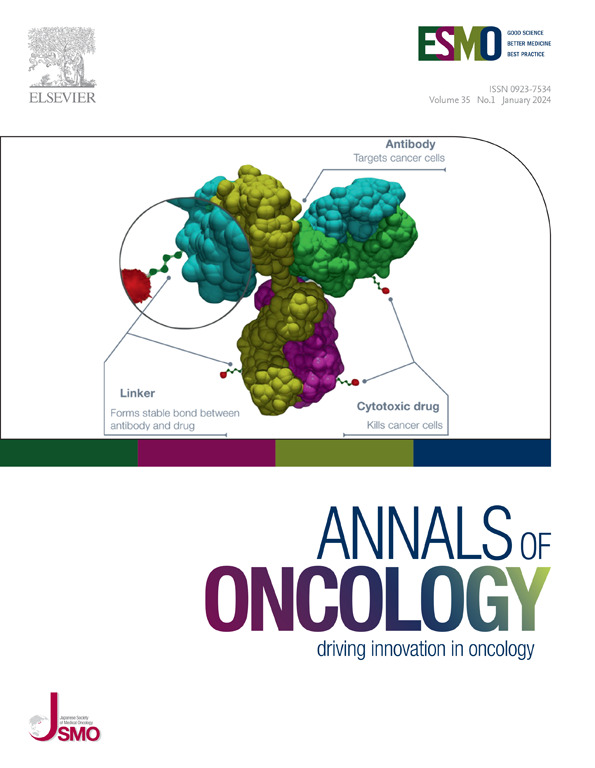Neo-adjuvant FOLFOX with and without panitumumab for patients with KRAS-wt locally advanced colon cancer: results following an extended biomarker panel on the FOxTROT trial embedded phase II population☆
IF 56.7
1区 医学
Q1 ONCOLOGY
引用次数: 0
Abstract
Background
The FOxTROT trial has reported advantages of neoadjuvant chemotherapy (NAC) in locally advanced colon cancer (LACC). In this article, we present results of the embedded randomised phase II trial testing the addition of panitumumab to neoadjuvant FOLFOX compared with FOLFOX alone in RAS and BRAF-wild-type (wt) patients and with biomarker hyperselection.
Patients and methods
Patients had operable, computed tomography-predicted stage T3-4, N0-2, M0 colon adenocarcinoma. KRAS-wt patients allocated to NAC could optionally be sub-randomised 1 : 1 to FOLFOX ± panitumumab during the preoperative phase. RAS/BRAF were tested by next-generation sequencing; and epiregulin (EREG)/amphiregulin (AREG) by RNAseq. The primary endpoint was time to recurrence (TTR) in RAS/BRAF-wt patients; secondary endpoints included safety, histological down-staging, disease-free survival (DFS), colon cancer-specific survival (CCSS), overall survival (OS) and impact of primary tumour location and EREG/AREG.
Results
In total 269 KRAS-wt patients were enrolled into the embedded phase II trial. Extended RAS/BRAF data were available for 232 (83%) patients; 22/232 (9.5%) were RAS-mutant; 41/210 (20%) were BRAF-mutant. Median follow-up was 42 months. In 169 RAS/BRAF-wt patients, there was a trend towards reduced recurrences with FOLFOX plus panitumumab compared with FOLFOX (12% versus 21%, hazard ratio = 0.51, P = 0.09); significant improvements were seen for DFS, CCSS and OS. Within the hyperselected EREG/AREG-high group, there was significant reduction in recurrences with panitumumab. Panitumumab was not associated with increased pathological regression of the primary tumour (tumour regression grade 1-3 16% versus 22%, P = 0.27). FOLFOX plus panitumumab was associated with higher rates of grade 3 diarrhoea (8% versus 3%) and rash (22% versus 2%).
Conclusion
This exploratory analysis from a randomised phase II study shows a non-significant improvement in TTR from the addition of neoadjuvant panitumumab to perioperative FOLFOX in RAS/BRAF-wt LACC. Hyperselection with EREG/AREG status was associated with increased efficacy. A dedicated prospective trial within a biomarker-selected population is under development.
针对KRAS-wt局部晚期结肠癌患者的新辅助FOLFOX(含或不含帕尼珠单抗):FOxTROT试验嵌入II期人群的扩展生物标志物小组的结果
背景:FOxTROT试验报道了新辅助化疗(NAC)治疗局部晚期结肠癌(LACC)的优势。在此,我们介绍了嵌入随机II期试验的结果,该试验测试了在RAS和braf野生型患者中,将帕尼单抗加入新辅助FOLFOX与单独使用FOLFOX相比,并进行了生物标志物超选择。患者和方法:患者为可手术、ct预测的T3-4期、N0-2期、M0期结肠腺癌。在术前阶段,分配给NAC的KRAS-wt患者可选择性地以1:1的比例亚随机分配给FOLFOX±帕尼单抗。采用NGS法检测RAS/BRAF;reeg /AREG通过RNAseq。主要终点是RAS/BRAF-wt患者的复发时间(TTR);次要终点包括安全性、组织学降期、无病生存期(DFS)、结肠癌特异性生存期(CCSS)、总生存期(OS)以及原发肿瘤位置和EREG/AREG的影响。结果:共有269名KRAS-wt患者入组了嵌入II期试验。232例(83%)患者可获得扩展的RAS/BRAF数据;22/232(9.5%)为ras突变体;41/210(20%)为braf突变体。中位随访时间为42个月。在169例RAS/BRAF-wt患者中,与FOLFOX相比,FOLFOX联合帕尼单抗有降低复发率的趋势(12% vs 21%, HR=0.51, p=0.09);DFS、CCSS和OS均有显著改善。在高选择的EREG/AREG高组中,帕尼单抗的复发率显著降低。帕尼单抗与原发肿瘤病理消退增加无关(TRG 1-3 16% vs 22%,p=0.27)。FOLFOX联合panitumumab与更高的3级腹泻(8%对3%)和皮疹(22%对2%)发生率相关。结论:这项随机II期研究的探索性分析显示,在RAS/BRAF-wt LACC的围手术期FOLFOX中添加新辅助帕尼单抗对TTR没有显著改善。伴有EREG/AREG状态的超选择与疗效增加相关。在选定的生物标志物人群中进行的专门的前瞻性试验正在开发中。临床试验注册:ISRCTN87163246。
本文章由计算机程序翻译,如有差异,请以英文原文为准。
求助全文
约1分钟内获得全文
求助全文
来源期刊

Annals of Oncology
医学-肿瘤学
CiteScore
63.90
自引率
1.00%
发文量
3712
审稿时长
2-3 weeks
期刊介绍:
Annals of Oncology, the official journal of the European Society for Medical Oncology and the Japanese Society of Medical Oncology, offers rapid and efficient peer-reviewed publications on innovative cancer treatments and translational research in oncology and precision medicine.
The journal primarily focuses on areas such as systemic anticancer therapy, with a specific emphasis on molecular targeted agents and new immune therapies. We also welcome randomized trials, including negative results, as well as top-level guidelines. Additionally, we encourage submissions in emerging fields that are crucial to personalized medicine, such as molecular pathology, bioinformatics, modern statistics, and biotechnologies. Manuscripts related to radiotherapy, surgery, and pediatrics will be considered if they demonstrate a clear interaction with any of the aforementioned fields or if they present groundbreaking findings.
Our international editorial board comprises renowned experts who are leaders in their respective fields. Through Annals of Oncology, we strive to provide the most effective communication on the dynamic and ever-evolving global oncology landscape.
 求助内容:
求助内容: 应助结果提醒方式:
应助结果提醒方式:


